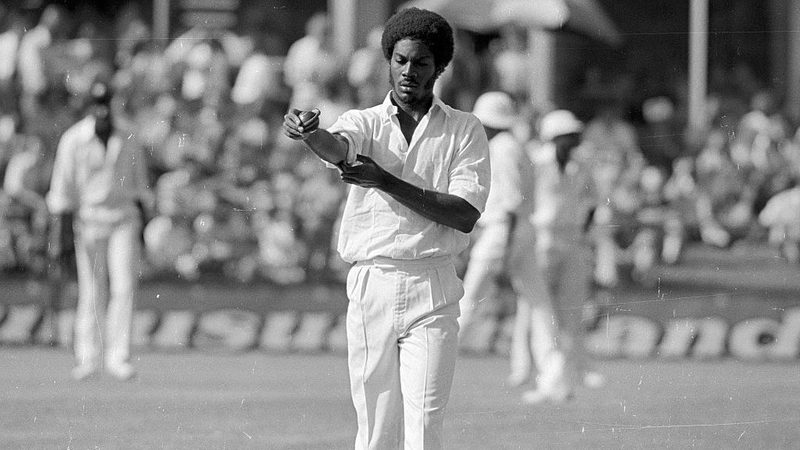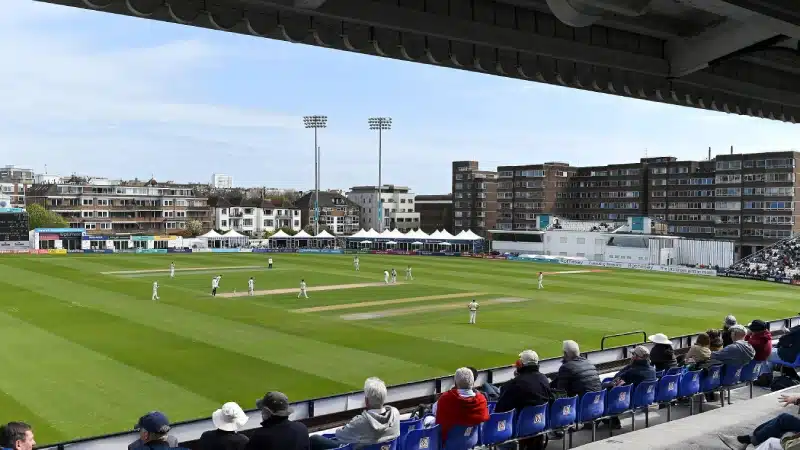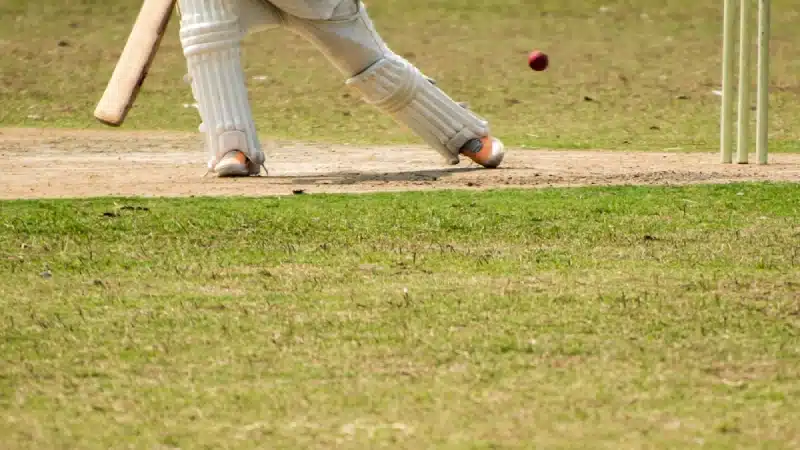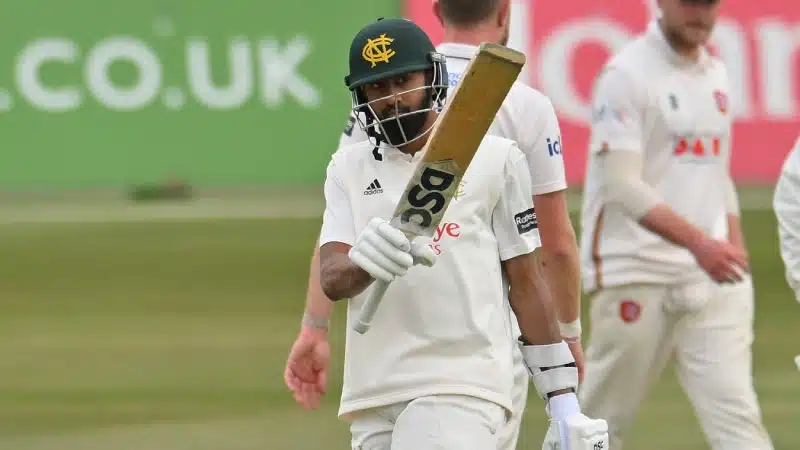
A cricketer, commentator, author and now an activist. These are just some of the hats that the legendary Michael Holding has donned during his five decade association with cricket which propelled him to the public eye. However for cricket puritans, Holding will always be the menacing West Indian bowling great who struck fear in the hearts of opposition batsmen, aptly earning him the nickname, Whispering Death.
Ask him about that moniker and Holding will quip that he only became great after his retirement, nevermind the 249 wickets that he claimed at an average of 23.68 in his 60-match Test career, such is his humility.
Part of the great West Indies team of the 1970s and 80s, his modest self-assessment, reading of the game and observations of global society are just a few layers of the Windies great and here we explore some of these wide array of topics with none other than the man himself in an exclusive interview with SportsAdda.

How was the West Indies team, its culture, camaraderie and leadership? Can you tell us what made your team of the 70s and 80s The Invincibles?
Michael Holding: This is something that I’ve written about as well. What helped that team a lot is that almost all of the team and the squad were involved in the World Series Cricket. We had camaraderie, team spirit, and togetherness for two years in Australia in 1978-79. Besides that, we adopted a different attitude towards the game.
Now, the West Indies produced a lot of great cricketers. From many years back you can count the names but I don’t think we were ever a team like we became under Clive Lloyd. It had a lot to do with him and his leadership and, of course, the way he dealt with the players. He respected the players and the players respected him and there was no politics involved when Clive Lloyd was the captain.
We became a lot more professional as a set of cricketers during World Series Cricket. We became a lot fitter because of Dennis Waight, who was assigned to be our trainer and physiotherapist. He got us extremely fit and motivated. Afterwards, he joined the West Indies team which helped us a lot. Obviously, we had a lot of talented cricketers but teams in the past also had talented cricketers. So, all those things coming together helped us become the team we were.
Please name two other teams from that era that were as formidable and impressive?
Michael Holding: When we were pretty much dominating, the toughest teams to beat were Pakistan and Australia. We didn’t really struggle against most teams as we handled them pretty well. We had a bad tour of New Zealand in 1980 which was a controversial tour. People recognized the fact that we were not playing against just 11 players. But on a playing field, we found Australia and Pakistan the most difficult to beat. Even though we beat them in their countries, those were the tough teams.
You are widely regarded as a fast bowling legend. Tell us about your colleagues of the time?
Michael Holding: I don't know about this legendary thing (laughs). We had a lot of great players and fast bowlers on that West Indies side. Andy Roberts was a great fast bowler. I don't think when I played with Andy, I was as near as great as he was. Similarly with Malcolm Marshall. A lot of people have portrayed me to be a great fast bowler since I retired (in 1987).
The mere fact that I’ve been on television and people have seen and heard me on the radio has kept me in their minds. In my opinion, it seems that I’ve gotten better since my retirement than when I played. So, I wouldn’t say that I’m a legend. People have that idea because of television and commentary. But Andy Roberts and Malcolm Marshall. If I was picking the West Indies team and if I had to pick two fast bowlers, it would be those two.
Besides being the bowling great that you are, you’re also a champion activist, who fights against inequality and racism. What are your thoughts on the subject?
Michael Holding: Racism is not in cricket, racism is in the world. Racism is all over the world. People like to talk about racism in football, cricket, etc. What people need to recognize is that racism is in society and until we fix society, we won’t get rid of it.
Your speech on racism in 2020 is considered a masterpiece. Can you say something about that?
Michael Holding: I didn’t experience a lot of racism as a young man when I toured the world and played cricket but I saw it. I’ve had a few occasions and as I wrote in my book, when I came across anything as such, I brushed it off, forgot about it, and moved on because that was not my living experience. If I had grown up in the United States, South Africa or England as a black man and gone through those experiences, it would have been a lot harder.
When you speak to people of colour who grew up in those countries, they can tell you about some horrible stories and experiences. I’ve never had those horrible experiences but I did have some incidents but nothing in comparison to the people who grew up in countries like that.
So when I spoke, I was speaking about my experience and also what I’ve learned and seen by touring and living in certain countries. It was something that was inside me for a long time because I’ve experienced it and also because a few friends have told me stories and I have no reason to doubt them.
Your book ‘Why We Kneel and How We Rise’ features big names like Usain Bolt, Naomi Osaka and Michael Johnson. What was the initial reaction that you got from the people you are familiar with?
Michael Holding: I got a lot of positive feedback about the book from tons of people which include the people I know and I don’t know. A lot of people are coming to recognize that racism is a serious problem and a lot of people have realized that we need to do something about it. There are a lot of good people who seem to go about their lives without experiencing too many problems, so they don’t focus on what others have to deal with day-in and day-out.
But when they read about it, they get awakened and realize that they can do something about the situation because my book is full of facts, not opinions. No one can dispute them and people are learning by reading the book. The feedback was fantastic.
The way the world is now, where do you see racism in sport in 20 years?
Michael Holding: Well, we are making progress. They are not lynching black people in America. The police officers who shot are behind the bars and have been found guilty. There’s not much open and ‘in the face’ racism found. In the BLM protests, many white and black people have come together to try to make the world a better place. However, something that has been going on for centuries will not change in decades.
Are you aware of a movie called 83 that was released in India recently? It created a lot of buzz and earned critical appreciation, if not commercial success. What happened in that game for the West Indies and was it a David-Goliath contest?
Michael Holding: Yeah, I know about it (the movie). I have a lot of friends in India who have told me about it and sent me articles about the movie. And well, it was a David-Goliath contest. It was one of those games that people never expected West Indies to lose. But that is One-Day cricket. One-Day cricket is won by the team that plays better that day and India played better cricket that day. That is why it is different from Test Cricket. You can have a bad day in a Test match and can recover but in One-day, it’s over.
Cricket is becoming a batter’s game. Ravi Shastri recently asked for more bouncers to make the game even. What is your take?
Michael Holding: I don’t have a problem with the law of two bouncers per over. If you’re a good enough fast bowler, you don’t need to bowl a ball over a batsman’s shoulder. What’s the point in that? Even if you want to do one or two in an over, you don’t need more than that. It is one-third of an entire over. Even if people start complaining about that, I ignore them as it is ridiculous. Where you want to bowl a short bowl is under the batsman’s armpit to make it uncomfortable for him. Would you need more than two balls? Come On! Don’t use it as an excuse. What they need to do is make good pitches that offer both the batsmen and bowlers something. Pitches are what determine good cricket.
With broad bats, small grounds and power-play rules, the bowlers are facing a huge disadvantage. What would you suggest to make the contest between bat and ball more even?
Michael Holding: I’m not worried about the people in One-Day Cricket -- be it ‘how small the boundaries are, how big are the bats’. As far as I’m concerned, it is purely for the entertainment of the fans. What I’m worried about is Test match cricket. Anything outside that, I don’t care. Right now, they are ignoring Test cricket and it is not getting the recognition I think it deserves. The administrators like making money rather than protecting the game. It doesn’t bother me anymore. I have moved on.
Speaking of the ICC, three World Cups in three years - two T20 World Cups back to back in 12 months - do you believe this will invigorate the game after the COVID lull?
Once again, I don’t care about that (white-ball) cricket. That is just for entertainment and a money-making business.
What are your thoughts on Virat Kohli giving up all captaincy? How will it affect Indian cricket?
Well, that is left to be seen. He went to Australia with the Indian team and played the first Test match and went home after that. Who knows what happens when a great player moves on from the team or from captaincy? The rest of the team filled the gap somehow. We have seen similar situations when Don Bradman retired from cricket, but Australia didn’t fall apart.
You are an advocate for Test cricket and so is Virat Kohli. After his era ends, do you feel Tests will struggle for such ambassadors?
It doesn’t matter about Kohli. The greatest cricketer in the world retired many years ago. Cricket is still continuing and Test cricket is still continuing. Sunil Gavaskar and Sachin Tendulkar in India retired. That didn’t affect cricket. What affects cricket is the administrators and how the game is promoted, seen and protected. The game is being ignored and not being taken care of because all the administrators want is money.
Author: Sandilya Garimella
Follow us on Telegram for the latest updates from the world of sports!
Interested in cricket betting? Click here to check out the list of top sites.
Featured photo: ICC




















